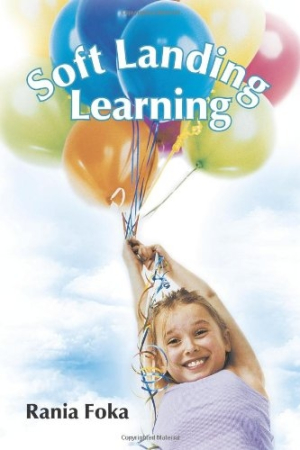Soft Landing Learning
Rania Foka’s Soft Landing Learning is directed at parents whose children are learning a second language, especially English, but this book has a much wider scope. Foka’s advice is relevant for all parents, whether their children are learning a new language or entering primary school.
In the chapter “Can We Help Our Child Become Successful?” Foka coaches parents on how to encourage their children and introduce new experiences: “We should always think positively regarding our child’s intelligence, and we should feed it in the best possible way by encouraging the child to use this intelligence and prepare the child in such a way as to become ambitious.”
While some of Foka’s advice is self-evident, much of the book is quite useful. She focuses the beginning of the book on parenting from an early age, reminding readers that memory is based on imagination, and that they should recall their own upbringing and education when helping their children to learn. She encourages parents to answer each question posed by a child in an honest and positive way, and her advice is inspiring and engaging.
Soft Landing Learning is extremely practical by design. Following a relevant theoretical discussion, Foka lists useful exercises for teaching another language to a child. The format of the book is logical, and the layout is easy to follow. The cover is colorful and eye-catching, and the printing is professionally done.
Foka includes many helpful autobiographical stories about raising her own daughter and working as a teacher for thirty-seven years. She includes pertinent information about children’s computer usage and explains how starting early increases a child’s likelihood of success in school. She raises the question of when to begin teaching a child a second language and offers many reasons for why learning another language is beneficial for development, suggesting that it improves the child’s potential to achieve success and independence.
Foka’s ideas are of the highest caliber, but her text is in dire need of comprehensive editing. In addition to fragmented sentences and mismatched tenses, the syntax is often so jumbled that meaning is lost. Readers will have to endure several typos per page. Given that Soft Landing Learning is about the importance of language, these mistakes undermine the credibility of the author’s message.
Providing these problems are remedied, Soft Landing Learning deserves an international audience. Because of the author’s background and her convincing arguments, readers will be excited to try her exercises with their own children.
Reviewed by
Colby Cedar Smith
Disclosure: This article is not an endorsement, but a review. The publisher of this book provided free copies of the book and paid a small fee to have their book reviewed by a professional reviewer. Foreword Reviews and Clarion Reviews make no guarantee that the publisher will receive a positive review. Foreword Magazine, Inc. is disclosing this in accordance with the Federal Trade Commission’s 16 CFR, Part 255.

